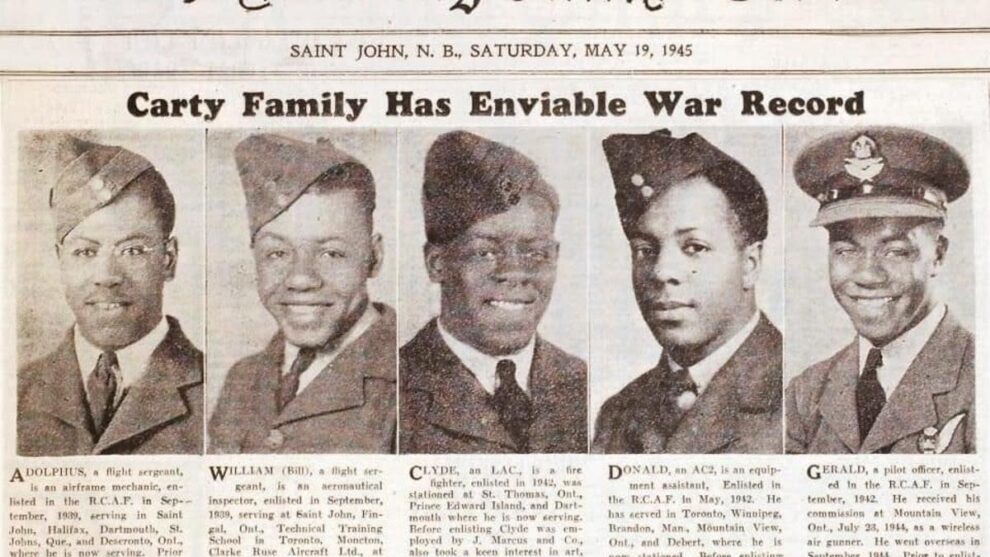Millard Kelley, 88, grew up and attended school in Pumpkin Hollow, approximately eight miles east of Tahlequah.
He came of age during tough economic times in the country but found work with the 3C or Civilian Conservation Corps in Wagoner and Grand Junction, Colorado. He worked in CCC camps from 1938 until December 1941 when the Japanese navy bombed Pearl Harbor in Hawaii.
To mobilize for war, the government downsized CCC camps and Kelley returned to Oklahoma from Colorado to work at another camp. By then his brother, Granville, had left the CCC and was drafted into the Army. Millard soon followed him into the Army after being drafted.
“My dad seemed pretty upset about me leaving. He acted like he didn’t think he would ever see me again. I was pretty confident I would come back, but I didn’t expect him to die before I got back home,” Kelley said. “I told my mom that I was leaving and didn’t know when I would be back, if ever. I am here to say that it was a very hard road back.”
The 20-year-old was inducted Nov. 4, 1942, and sent to Fort Sill in Lawton, Oklahoma, and then to Camp Roberts in California where he received 13 weeks of basic training.
“We came out of there first-class soldiers, or we thought we were, anyhow,” he said. “In basic training, I always scored high on all weapons – rifle, machine gun and grenade. They taught us to lob the hand grenade. You couldn’t really control where you were going to hit. I told them if they’d let me do it like I wanted to I could hit it (target). I threw it like a baseball and hit the target every time. I had lots of practice killing squirrels with rocks … when I was a kid.”
Kelley said someone asked him after the war if he had ever thrown a hand grenade. He told them, “yeah, probably 200 or 300 of them.”
After basic training, he spent a month in Chenango, Pennsylvania, before being sent to Camp Kilmore in New Jersey. One day, the Army loaded his unit on tarp-covered trucks and drove them to New York City to a harbor. They boarded a ferryboat and then loaded on a ship called the “Emperor of Scotland,” which actually was a Japanese ship that had been captured by the British Navy in the Pacific.
On the ship with Kelley were men from Adair and Cherokee counties, from Proctor, Christie, Stilwell and Tahlequah. The Army had kept the men together through basic training. After 12 days crossing the Atlantic and dodging German U-boats (submarines), the ship landed at Casablanca, Morocco, in northern Africa.
“We went in as replacements in North Africa. That’s where they split us up. We didn’t know where each other went for quite a while, but a majority of us ended up in the 34th Division,” he said.
Specifically, Kelley was assigned to the Company D, 1st Battalion, 133rd Infantry Regiment of the 34th Division. Company D was a heavy weapons company responsible for moving and shooting 81mm mortars and 30-caliber machine guns, along with their M-1 rifles and smaller machine guns.
Kelley said he was likely placed with the heavy weapons company because he had scored expert with firing mortar rounds and the 30-caliber machine gun.
After organizing, the 21,000-man “Red Bull” Division traveled through Algeria and then Tunisia. The division spent more than 550 days in combat in North Africa and Italy. It first saw action in Tunisia against German units led by Gen. Erwin Rommel. After some setbacks, Allied forces pushed the Germans out of Africa. The 34th was in Africa for about eight months and took 600,000 prisoners, Kelley said, but Rommel and his unit escaped.
“The 34th Division lost a lot of men,” he said.
Following the North Africa campaign, the 34th was absorbed into the new 5th Army and prepared to invade Italy. The invasion began Sept. 18, 1943, with the 34th landing at Salerno.
“We had to crawl off the side of the ship in a landing barge. Then, they dropped the end of the boat (barge) everybody tried to get to the hill. That’s where we lost most of the 34th Division. The Germans used a lot of mines and booby traps,” he said.
Due to attrition in his unit, Kelley quickly rose to the rank of sergeant whether he wanted it or not.
“Lieutenants changed so fast you didn’t hardly know one week to the next who you had. We lost so many men that you hardly got to know the new ones coming in. I had to keep track of my men, but half of the time we were short some positions,” he said. “There is no way that I could tell anyone what all took place there. We lost so many boys there.”
On Oct. 19, 1943, the 133rd Regiment was given the mission of crossing the Volturno River and securing the town of Alife. The river was swollen after three days of rain, Kelley said, which made the crossing more difficult. And the Germans were determined to keep the Americans from crossing. But the Americans succeeded.
“We fought long and hard. Then we finally got what they called ‘reserve,” he said. “It wasn’t rest. And you never got away from the sound of the guns. It rained a lot, mud up to our knees sometimes. There was no glory in the infantry.”
November brought colder weather but the 133rd pressed on, fighting uphill, Kelley said, because the Germans always had the high ground.
“They could see us, but we couldn’t see them,” he said. “We went into the mountains at Piedmont. It was rocky with no trees. We had to go through the mountains because it wasn’t safe going through the valley.”
The exhausted men slept the best they could even if they had to stand while sleeping. They also dealt with extreme cold. Kelley said he came “pretty close to freezing plum to death” twice. Fighting was so heavy and constant that Kelley didn’t remove his boots for 76 days straight as the Allied forces pushed the Germans north toward the Alps.
“The Germans were dug in deep, in caves and shelters in the mountains. They used the Apennines Mountains with their deep valleys, foggy hollows and rain-swollen streams and rivers to slow us down to a crawl. Yes, I did crawl on my belly a lot,” he said. “I know it had to be the hand of God that I’m still alive to tell about it. People back home told me later that there would be people who came to visit my mama and sometimes she would excuse herself and say, ‘I’ve got to go pray for my boys.’”
Millard’s brother Granville was also serving in the Army in Italy.
The 133rd Regiment finally made it to the edge of Cassino, which was at the bottom of a mountain. In January 1944, the unit began crossing the Rapido River that sat on the east side of Cassino. Crossing the 25-foot-to-50-foot wide and 10-foot-to-15-foot deep river cost the 133rd 300 casualties. American units suffered 3,000 casualties by the end of January trying to take Cassino, and by the time the famous battle ended on Feb. 21, the regiment’s three battalions suffered 50 percent casualties.
Again, the Germans had the high ground around Cassino. They used a monastery located 1,700 feet above the town as an observation post and easily targeted American troops trying to move forward.
“Finally, the Allied forces ordered the bombing of the abbey (monastery). They dropped 1,150 tons of bombs on the abbey. We were on the side of the mountain when the U.S. bombed it,” Kelley recalled. “You had to take all the protection you could because there was rocks and stuff flying as big as automobiles. When the first flight came in you didn’t know where the bombs was a going … it looked like they was fixing to land on top of you.”
He said the bombing didn’t seem to affect the Germans much because they hid in caves or went deeper underground.
“They were just as strong, but we kept pushing forward,” he said.
After fighting for four months, the 133rd pulled back to Naples for rest and refitting and then was ordered to make another beach landing at Anzio, 35 miles southwest of Rome. The battle at Anzio had begun in January, but the 133rd didn’t take part until late May 1944 and helped the Allies push German forces north of Rome.
“When we broke through Anzio, the Germans back at Cassino made a run for it. They knew they had to pull out of there or they’d get trapped. They headed north back to the next line…above Rome,” Kelley said. “The purpose of Anzio was to draw six divisions of Germans out of France. It weakened their forces so they (Allies) could take Normandy (France). The bottom line is they sacrificed a bunch of people in Italy to accomplish what they did in France at Normandy.”
On June 8, the 133rd entered Rome and was allowed to rest.
“My britches were plum worn out. There was a guard with a rifle … guarding a pile of new clothes they were fixing to burn. So, I started stripping off so I could find a new pair of pants that fit. The guard ordered me to halt,” Kelley said. “I gave him a few choice words and told him he could shoot me if he wanted to, but my rear end was showing and I was getting me some britches. He backed off and let me grab a pair.”
The unit moved from Rome into the mountains north of the city. It was there where Kelley lost his best friend, James Cicchillo, when the Germans dropped bombs on a mountainside and part of it caved in on Cicchillo’s platoon. Kelley and others dug the men out of the rubble with their hands.
“They brought in some mules to take them out. We laid them across the mules and even they must have felt our grief … they stood real still and moved real slow,” he said. “It was about too hard for me to take. It seemed like God died that night. Cicchillo was from Youngstown, Ohio. I wondered if anyone in that town even knew what a wonderful boy they lost.”
On July 8, 1944, two days after his 22nd birthday, Kelley and the 133rd relieved another regiment near Riparbella, Italy, and continued the attack north over “very rough terrain.” In September, the unit was near Florence, and shortly thereafter, broke out of the mountains and went into the Po Valley to Bologna.
“Then the Germans didn’t have any place to go. The only thing they had left for them was to try to give up,” he said.
German forces were trapped at Brenner Pass in the Swiss Alps and could not escape into France or Yugoslavia because Allied bombers had cut them off. The German 34th Division surrendered to the U.S. 34th Division.
The war had taken a toll on the American 34th since it had arrived in North Africa. Kelley said 3,300 men were killed, 3,400 went missing and 15,000 men in the division received the Purple Heart for wounds received in combat.
“I could have gotten a Purple Heart several times, but I didn’t have time to stop fighting long enough to get it documented,” he said. “We just had to keep going. Lots of them couldn’t handle the stress and went berserk. You couldn’t think about it; you just had to keep fighting and keep going and try to keep from getting killed yourself.”
Kelley said he spent nearly 30 months overseas and fought in every major battle in North Africa and Italy. He received the Bronze Star, Good Conduct Medal, European-African-Middle Eastern Service Ribbon and one Silver Service Star.
He was awarded the Bronze Star for action on Oct. 21, 1944, when he crawled through heavy artillery fire to rescue a wounded soldier about 200 yards in front of his observation post. His citation states he put the wounded soldier on his shoulders and made his way back through the heavy artillery barrage to an aid station.
He received an honorable discharge as a staff sergeant on Sept. 27, 1945, and took a bus from Camp Chaffee near Fort Smith, Arkansas, to Tahlequah.
“That was close enough for me. I could walk the rest of the way home.”
Source: Cherokee Phoenix
















